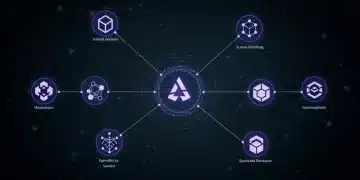Bitcoin Smart Contracts: US Decentralized App Potential

Bitcoin smart contracts, leveraging Bitcoin Script, offer the potential to create decentralized applications (dApps) within the United States, enabling innovative financial instruments and enhanced security.
The world of cryptocurrency is constantly evolving, and among the most exciting developments is the potential for Bitcoin smart contracts to revolutionize decentralized applications (dApps) in the US.
Understanding Bitcoin Script and Smart Contracts
Bitcoin Script is the scripting language used by the Bitcoin network. Understanding it is crucial to understanding how smart contracts can be implemented on the Bitcoin blockchain.
What is Bitcoin Script?
Bitcoin Script is a stack-based, simple, and Turing-incomplete scripting language. It’s designed for defining transaction conditions and ensuring secure transfer of value.
How Bitcoin Script Enables Smart Contracts
By leveraging Bitcoin Script, developers can create conditions that must be met before a transaction is validated. These conditions form the basis of smart contracts on the Bitcoin network.

Here are some key aspects of Bitcoin Script:
- Limited Functionality: Bitcoin Script avoids complex loops to prevent potential security vulnerabilities.
- Transaction Authorization: It allows users to set specific conditions for authorizing transactions.
- Security Focus: Bitcoin Script prioritizes security by minimizing complexity and potential attack vectors.
In summary, Bitcoin Script is fundamental to understanding the basics of how smart contracts operate within the Bitcoin ecosystem, providing a secure way to automate and enforce agreements.
The Potential of Decentralized Applications (dApps) in the US
Decentralized applications (dApps) are software applications that run on a decentralized network, such as a blockchain. They can revolutionize various industries by increasing transparency and security.
Benefits of dApps
dApps offer several advantages, including increased transparency, enhanced security, and elimination of intermediaries. These benefits can lead to more efficient and trustworthy applications.
Use Cases for dApps in the US
In the United States, dApps can be applied to various sectors, such as finance, healthcare, and supply chain management, offering innovative solutions and improved processes.
Consider these examples of how dApps can be used:
- Decentralized Finance (DeFi): Offering lending, borrowing, and trading services without traditional banks.
- Healthcare Management: Securely managing and sharing patient data.
- Supply Chain Tracking: Ensuring transparency and traceability of goods from origin to consumer.
Therefore, dApps hold substantial promise for various applications across different sectors in the US market, providing new opportunities for innovation and efficiency.
Challenges and Limitations of Bitcoin Script
While Bitcoin Script offers the potential for creating smart contracts, it also faces several challenges and limitations that must be addressed to fully realize its potential.
Scalability Issues
Bitcoin’s blockchain has limited scalability, which can affect the performance of smart contracts. This limitation can lead to slower transaction times and higher fees.
Complexity of Scripting
Bitcoin Script is not as versatile as other smart contract languages, making it challenging to implement complex logic. This complexity can restrict the types of dApps that can be created.
Here are some constraints faced when using Bitcoin Script:
- Turing Incompleteness: Bitcoin Script lacks the full computational capabilities of Turing-complete languages.
- Limited Op Codes: The number of available op codes is restricted to ensure security.
- Complexity in Design: Creating complex smart contracts can be intricate and hard to manage.
In short, the limitations of Bitcoin Script present hurdles that need to be addressed by ongoing research and improvements to enhance its capabilities for building more resilient and advanced dApps.
Layer-2 Solutions for Bitcoin Smart Contracts
To overcome the limitations of Bitcoin Script, layer-2 solutions have been developed to enhance the functionality and scalability of smart contracts on the Bitcoin network.
The Lightning Network
The Lightning Network enables faster and cheaper transactions by conducting them off-chain. This enhances the performance of Bitcoin smart contracts by reducing congestion on the main chain.
Sidechains
Sidechains are separate blockchains that are pegged to the Bitcoin blockchain, allowing for greater flexibility in smart contract implementation and experimentation with different scripting languages.
Common strategies for implementing layer-2 solutions include:
- State Channels: Enabling off-chain contract execution and on-chain settlement.
- Drivechains: Allowing for the secure adoption of new features and functionality.
- Rollups: Bundling multiple transactions into one for improved efficiency.
In essence, layer-2 solutions provide crucial enhancements to Bitcoin, making it a more versatile and efficient platform for implementing complex smart contracts.
Real-World Examples of Bitcoin Smart Contracts in the US
Despite the challenges, there are several real-world examples of Bitcoin smart contracts being used to create innovative applications in the United States.
Decentralized Lending Platforms
These platforms use Bitcoin smart contracts to facilitate peer-to-peer lending and borrowing, eliminating the need for traditional financial institutions. Smart contracts automate the lending process, ensuring transparency and security.
Escrow Services
Bitcoin smart contracts can be used to create secure escrow services, where funds are held in a smart contract until certain conditions are met. This ensures both parties fulfill their obligations.
Some notable applications include:
- Automated Payments: Automating payments based on predefined conditions.
- Tokenized Assets: Creating digital representations of physical assets on the Bitcoin blockchain.
- Supply Chain Solutions: Tracking and verifying the movement of goods using blockchain.
Therefore, Bitcoin smart contracts are already demonstrating their utility in various real-world applications, enhancing the innovation and security of digital transactions.
The Future of Bitcoin Smart Contracts in the US
The future of Bitcoin smart contracts in the US looks promising, with ongoing developments and increasing adoption poised to transform various industries.
Advancements in Bitcoin Script
Continued improvements to Bitcoin Script, such as the addition of new op codes and enhanced functionality, will enable developers to create more sophisticated smart contracts. These improvements can unlock new possibilities for dApps.
Regulatory Landscape
The regulatory landscape surrounding cryptocurrencies and smart contracts is evolving, and clearer regulations will foster greater adoption and investment in Bitcoin smart contract technology. A well-defined regulatory framework can provide clarity and attract more developers and users.
Consider these predictions for the future:
- Increased Adoption: More businesses and individuals will adopt Bitcoin smart contracts as they become more user-friendly and secure.
- Regulatory Clarity: Clearer regulations will reduce uncertainty and encourage innovation.
- Integration with Traditional Systems: Bitcoin smart contracts will increasingly integrate with traditional financial and legal systems.
In conclusion, the future of Bitcoin smart contracts in the US is bright, with continuous advancements and increasing adoption expected to impact numerous sectors positively.
| Key Aspect | Brief Description |
|---|---|
| 🔑 Bitcoin Script | Scripting language for Bitcoin transactions. |
| 💡 Decentralized Apps | Applications running on a decentralized network. |
| ⚡ Layer-2 Solutions | Enhancements for Bitcoin scaling and functionality. |
| 🏛️ US Adoption | Growing interest and implementation in various sectors. |
Frequently Asked Questions
Bitcoin smart contracts use Bitcoin Script to automate and enforce agreements on the blockchain, ensuring secure and transparent transactions without needing intermediaries.
Bitcoin Script allows developers to create conditions that must be met before a transaction is validated, forming the foundation for decentralized applications on the Bitcoin network.
Bitcoin Script has scalability issues and limited functionality compared to other smart contract languages, making implementing complex logic more challenging.
Layer-2 solutions, such as the Lightning Network, enhance functionality and scalability by enabling faster and cheaper off-chain transactions, improving the performance of smart contracts.
Examples include decentralized lending platforms and escrow services that use Bitcoin smart contracts to facilitate peer-to-peer transactions and secure fund holding until conditions are met.
Conclusion
Exploring the potential of Bitcoin smart contracts and Bitcoin Script reveals significant opportunities for decentralized applications in the US. Addressing the limitations through layer-2 solutions and ongoing script improvements will pave the way for broader adoption and innovative use cases.





